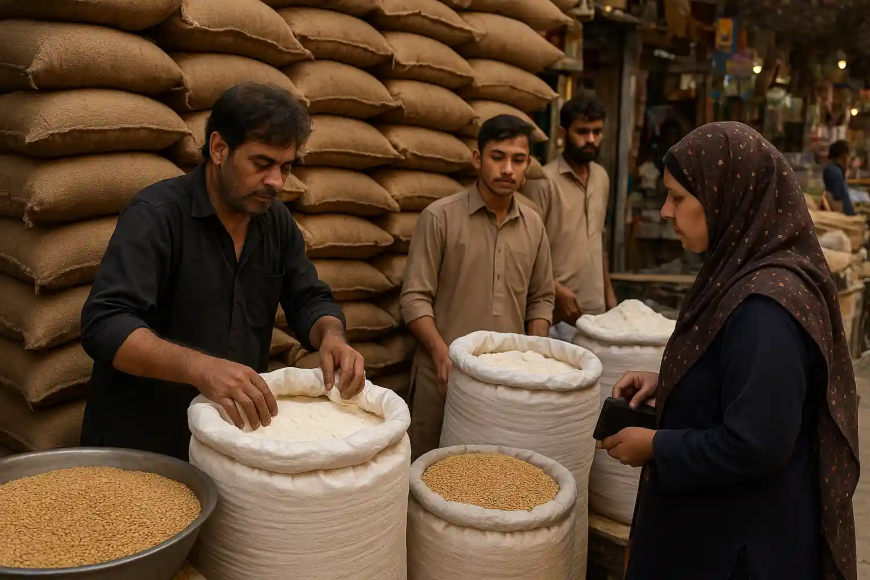After Sugar Crisis, Wheat and Flour Prices Also Begin to Rise
After the sugar crisis, wheat and flour prices in Pakistan are also rising, adding pressure on consumers and increasing concerns over food inflation.

The sugar crisis in Pakistan has now been followed by a surge in wheat and flour prices. The most basic expense in households — bread — is becoming unaffordable for the common man.
From Karachi to Lahore and Islamabad, wheat and flour prices have jumped by 10–15%. A kilo of flour that was recently sold at Rs. 130–140 is now available at Rs. 150–160. Dealers warn that if the situation is not controlled, there may be further increases in the coming month.
Public Hardship – Daily Bread Out of Reach
The biggest issue is that bread is consumed more than anything else in Pakistani households. When bread becomes expensive, it affects every family, every dining table, and every budget.
A customer in Lahore said:
“After the sugar crisis, we thought things might normalize, but now flour has become expensive too. It’s becoming difficult to make daily bread.”
The sugar crisis in Pakistan has now been followed by a surge in wheat and flour prices. The most basic expense in households — bread — is becoming unaffordable for the common man.
From Karachi to Lahore and Islamabad, wheat and flour prices have jumped by 10–15%. A kilo of flour that was recently sold at Rs. 130–140 is now available at Rs. 150–160. Dealers warn that if the situation is not controlled, there may be further increases in the coming month.
Experts’ View – Supply and Global Market
Economic experts believe that multiple factors are behind this crisis:
-
Global Market Pressure – International wheat prices are rising, directly impacting Pakistan’s imports.
-
Transport and Fuel Costs – The increase in diesel prices has made transportation expensive, pushing up the final price of every commodity.
-
Supply Chain Issues – Certain areas of Punjab and Sindh are experiencing delays in supply.
-
Hoarding and Black Marketing – Some dealers are stockpiling and then selling at higher prices when demand rises.
Regional Comparison
-
Karachi: Local market flour has reached Rs. 160/kg.
-
Lahore: Flour is selling at Rs. 155/kg, with reports of shortages.
-
Islamabad/Rawalpindi: Subsidized utility store prices remain at Rs. 135–140, but with limited stock.
In every city, people are queuing in long lines yet still receive insufficient supply.
Wheat and Flour Prices in Pakistan
|
Wheat / Flour Category |
Price (PKR) |
Region / Notes |
|
1 kg wheat price in Pakistan today |
Rs. 75 – 85 |
Based on Punjab/KPK average estimates |
|
40 kg wheat price in Pakistan today |
Rs. 2,250 – 2,550 |
Nationwide wholesale range |
|
40 kg wheat price in Punjab (2025) |
Rs. 2,350 – 2,850 |
Market range in Punjab |
|
Sindh 40 kg wheat market price today |
Rs. 2,300 – 2,800 |
Sindh provincial range |
|
Government support price (40 kg bag) |
Rs. 3,800 – 4,000 |
Official procurement price |
|
Typical retail flour (atta) price per kg |
Rs. 160 – 200 |
Whole wheat flour rate |
Government Response
Government officials say they are speeding up wheat imports and have begun monitoring dealers. The Ministry of Food Security claims emergency measures will be taken in the coming weeks to control prices.
However, the ground reality is that people have yet to feel any relief. Subsidized stores provide only limited stock, while inflation remains uncontrolled in open markets.
Social and Economic Impact
-
Household budgets have nearly doubled.
-
Bakeries and hotels are planning to raise their prices.
-
Daily wage earners are the most affected, as their income is limited while food costs keep rising.
A bakery owner explained:
“With flour prices rising, we are forced to increase the rates of bread and cakes as well.”
The Public’s Question
The biggest question today is: When will daily bread become affordable again?
People want the government to stop making promises and take practical steps. Until wheat and flour prices are brought under control, running a household will remain a struggle.
“Even with a weekly budget, it is impossible to manage. Every day inflation brings a new surprise.”
For More visits, Nationbytes.pk

 Israr Ahmed
Israr Ahmed